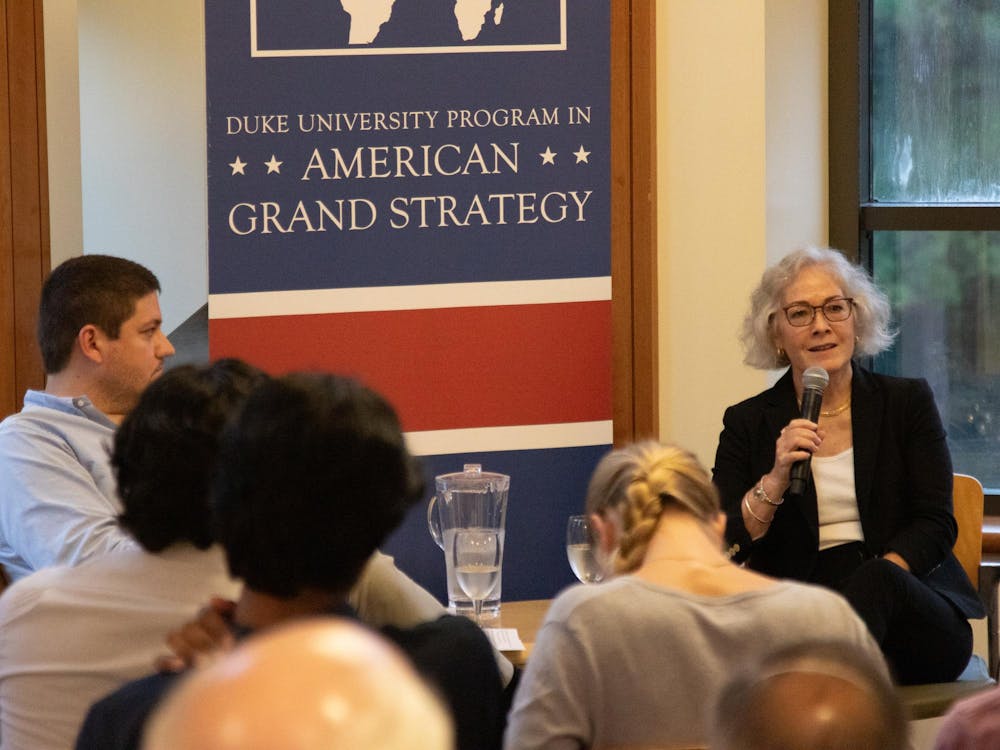Marie Yovanovitch, former U.S. ambassador to Ukraine, spoke at a Wednesday event about social and political developments in Ukraine in the context of Russia’s invasion in 2022.
She also spoke about the role of the United States in the war to defend its national security and promote democracy.
The discussion, hosted by Duke’s Program of American Grand Strategy, featured Simon Miles, assistant professor in the Sanford School of Public Policy, as its moderator.
Over the course of Yovanovitch’s 33-year career at the U.S. Department of State, she served as ambassador to Kyrgyzstan and Armenia before assuming the post of ambassador to Ukraine in 2016. She was dismissed in 2019 by former President Donald Trump over claims that she undermined efforts that pressured Ukraine to investigate President Joseph Biden and his son, Hunter.
Yovanovitch opened the talk by commenting on the recent Hamas’ attack on Israel and drawing a connection with the ongoing conflict in Ukraine. She noted that “forces of darkness” from state actors such as Russia to terrorist organizations such as Hamas are using “many of the same tactics” to threaten the world. As these challenges compound, she said that institutions such as the UN and NATO would need to be reformed, while preserving and advancing the ideals of “integrity of borders, sovereignty [and] national self-determination.”
Ukraine before and after the Russian invasion
Yovanovitch started with Ukraine gaining independence from the Soviet Union in 1991 and moved on to reflect on the nation’s difficult transition to democracy to this day. This period was punctuated by national demonstrations in 2004 and 2014 that called for the institution of rule of law and an end to political corruption.
“By the time I got there, for the first time, in 2001, there was a beginning of a civil society and there were people calling for reforms,” she said. “And there was a lot of progress made. I'm not saying it was smooth. I'm not saying it was easy, and it was sometimes one step forward, two steps back, and that continued on.”
Despite the “devastating war” following Russia’s invasion in February of 2022, Yovanovitch was surprised that the movement towards democracy has continued and showed optimism about the future direction of the agenda.
“The Ukrainian government is still standing. It is still providing services to the people for the most part, which is incredible. If you think about that,” she said. “I think that it doesn't mean that Ukraine is corruption free, it doesn't mean that all is going to be enlightened or beautiful when the war ends. But Ukraine continues on that same trajectory, which is a positive one for Ukraine, certainly, and I think a positive one for us.”
When Miles asked about the role of Ukraine President Volodymyr Zelensky during the conflict, Yovanovitch said that she did not expect the former actor and comedian to coordinate the country’s war effort. According to her, in the immediate aftermath of the invasion, Zelensky “went out to the square” and “started that tradition, which continues to this day of addressing the Ukrainian people almost every night in some form of social media.”
She credited Zelensky’s successful leadership to his skills in communication.
“What he wanted to impress me with was that he was a businessman, that he had built a studio on his own blood, sweat and tears,” she said. “And I think that to a certain extent, you can see that and how he's running his presidency for the good, that he does have experience in management, but also for the bad in that he is a micromanager.”
U.S. response to the conflict
Yovanovitch considers the United States’ support of Ukraine to be more than “doing this out of the goodness of our hearts” and “keeping with our values” of democracy, but also acting in its national security interests.
“Putin has a grandiose vision, that after he’s done with Ukraine, he is going to keep on going to other historically Russian lands,” she said. “And I think that means that if Ukraine is not able to stop Russia, in Ukraine, you know, we, in some form, are going to have to do that.”
Although Yovanovitch was not sure what “grade” to give the Biden administration on its handling of the conflict in Ukraine, she said that “it's a pretty good one.” She praised the speedy effort of the administration to make assessments on Russia’s deployment of troops in Ukraine and facilitate “pre-planning with allies” even before the invasion.
“Think of where we were in December of 2021, when all of that intelligence was being released about not only the troops and tanks that were surveilling in Ukraine, to me that was unprecedented,” she said.
The delivery of military assistance from the United States to Ukraine’s war effort, however, encounters significant bureaucratic, financial and transportational challenges.
“I share your frustration that as the weeks turned into months turned into years now that it seemed like every move, piece of equipment that was supposed to be game changing just took months to get those decisions off and running,” she said. “That said, the bottom line is we should be sending more to Ukraine and more quickly, I mean, that’s just the bottom line.”
Get The Chronicle straight to your inbox
Signup for our weekly newsletter. Cancel at any time.
Lucas Lin is a Trinity sophomore and a university news editor of The Chronicle's 120th volume.

